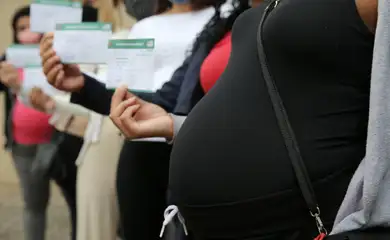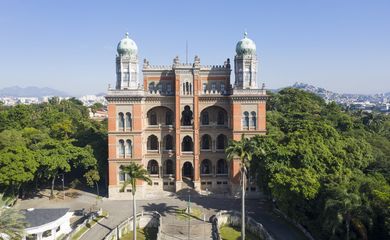Fiocruz opens bank capable of storing virus samples

The Oswaldo Cruz Foundation (Fiocruz) inaugurated today (13) the Biobanco Covid-19 (BC19-Fiocruz). The new unit, located on the Expansão campus in Rio de Janeiro, will allow the design and conduct of research, technological development and clinical trials related to the pandemic disease.

BC19-Fiocruz has the capacity to store up to 1.5 million samples of viruses, bacteria and fungi that could arise in a pandemic with a virus originating in Brazil and even from another part of the world. The Ministry of Health's investment was estimated at R$ 40 million, between the project, the work and the structuring of the permanent technological park. The construction also had complementary support from the Ministry of Science, Technology and Innovation.
The Minister of Health, Marcelo Queiroga, said that the Ministry of Health's investment is a commitment to the present, but, above all, to the future. According to the minister, along with the work that will be carried out at the site, Brazil shows that it is able to intensify its capacity to identify these viruses after strengthening the structure of the State Public Health Laboratories (Lacens).
“Today we have many more Lacens than we had before, and the proof of this is that we have identified one of the mutations of this virus here in Brazil, the gamma, which is important for the condition of Brazilian public health, but also worldwide,” he said.
According to the minister, the country is currently on the lookout for other possible variants of this virus, such as Ômicron, which was recently known to scientists in South Africa. He criticized possible punishments for countries that identify new mutations of the virus.
“11 cases have already been identified in Brazil, there must surely be more. When a variant is identified, it is not the case to punish the country that it identified. We do have to applaud those who identify these virus variants so that we can better prepare ourselves to fight these unpredictable threats caused by virus mutations”, he said.
Minister Queiroga recalled that Brazil recently signed a commitment within the scope of the G20 to strengthen the health system with global access and expand access to immunization agents and strategic supplies to face not only this health emergency caused by the new coronavirus, but others that may arise due to mutations of the virus itself or others that compromise the security of society.
“This investment in the area of research, science and technology is essential to expand this response capacity”, he said.
According to the minister, Fiocruz and its portfolio are inseparable and that the Ministry of Health can be considered a son of the foundation, because it results from the century-old tradition of public health in the country, led by Oswaldo Cruz, Carlos Chagas.
For the minister, the legacy that the two scientists left will remain alive forever and perhaps that is why Brazil has such a great capacity to vaccinate the population. “Brazil today is a world example in relation to the immunization campaign against covid-19 and that is why in the last six months we had a significant reduction in the number of cases and deaths resulting from covid-19 and consequently resulted in a lower pressure on our health system and a hope of containing the pandemic character of covid-19 and living in the much-awaited post-covid”, he added.
In Queiroga's view, Fiocruz has made an extraordinary contribution in relation to the fight against covid-19 and the most significant, for him, is the technological order made to the AstraZeneca Laboratory with technology transfer, resulting in the production of the vaccine with national IFA, which is in the final stages of the regulatory process for approval.
“[The IFA] will allow us to have the condition to produce up to 480 million doses in the year 2022. It is an extraordinary advance that comes from the union of all. From the federal government, which allocated significant resources to these actions, from the Oswaldo Cruz Foundation, with the capacity that its researchers have; the strengthening of the BioManguinhos industrial complex in Santa Cruz in the future and, yes, leave a legacy for our Unified Health System", he said, adding that the creation of the SUS "was a bet of our constituents in 1988, which proved to be over time very accurate”.
“Health as a fundamental right, health as a right for all and a duty of the State. I would like to congratulate everyone who is part of the Oswaldo Cruz Foundation for this Biobank and say that we are more and more secure in relation to sanitary problems”, said Queiroga.
Qualified service
Biobanco, a pioneering initiative, is installed in an area of 1,100 square meters and will function as a center providing highly qualified services and biological materials, with laboratory areas classified as biosafety level 2 (NB2).
According to Fiocruz, this will open space for national and international collaborations, in addition to strengthening the domestic market and reducing Brazil's international dependence in this area. With the structure, researchers will be able to develop evidence-based strategies, design treatment protocols and predictions based on precision medicine, using biological materials and data stored in the Biobanco.
“Biobanco represents a concrete response to the urgent demand of the SUS [Unified Health System], providing a pioneer structure in a time of health emergency and brings the result of an old project to implement the Fiocruz Center for Biological Resources in Health consisting of viruses, bacteria, fungi and protozoa and other biological materials of taxonomic, epidemiological and biotechnological interest, which will guarantee support for the preparation and rapid responses to future public health emergencies”, said the general manager of BC19-Fiocruz, Manuela da Silva.
The project has autonomy in water supply; effluent decontamination system with its own sewage treatment plant; center for various gases, including liquid nitrogen, for cryopreservation equipment; in addition to several specific systems to ensure the safety and traceability of samples, meeting the legal requirements of quality, biosafety and bioprotection.
Fiocruz's president, Nísia Trindade Lima, said that the foundation's new unit will make a decisive contribution to Brazilian science. “This event today, for us, has a special meaning, for the actions of science, technology and innovation, and for the surveillance actions in our country”, he said.
Nísia Trindade said that in addition to facing the health emergency of covid-19, the creation of the new research center is essential for the future of surveillance and public health in Brazil, which is also faced with the issue of preparation for possible health emergencies .
“Across the world, this is now a priority agenda that goes beyond health. It is the agenda of life, of the possibility of a sustainable development with equity and that makes nations be prepared for emergencies”, he said.
Project
The BC19-Fiocruz project was elaborated after debates that involved potential users gathered in a working group made up of professionals from different areas of the institution, including engineering, architecture, quality, biosafety and bioprotection, virology, molecular biology.
Text translated using artificial intelligence.



